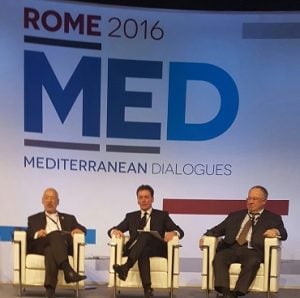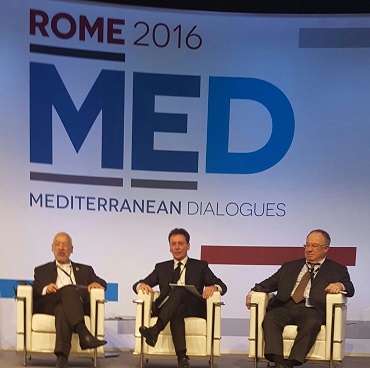By Sami Zaptia.

Rome, 3 December 2016:
The phase of Tunisian political Islam protesting against autocratic regimes is over explained Rashid Ghannouchi, President of Ennahda party of Tunisia speaking today at the Med 2016 Dialogues conference in Rome.
Ghannouchi was talking specifically on the Tunisian experience with post Arab Spring Political Islam – but there were clear messages and lessons to be learnt by neighbouring Libya.
Asked by Libya Herald what could be the best Tunisian lessons that could be learnt by its neighbour Libya he said: ‘‘consensus and compromise’’. He pointed out that the role of political Islam has to change in the new phase of post-authoritarianism. Political Islam has to transform itself from a movement of protest to a movement of democratic policy-making and government.
Tunisia was now in the post-autocratic era and is no longer in the midst of protesting against government. It was time for democratic Islam or Muslim democrats now, he explained.
He said that only ‘‘good interpretations’’ of Islam can succeed and added that the term ‘‘secular’’ was controversial and ambiguous. There is no common definition and it was used differently by different people in different contexts.
Ghannouchi said that modern interpretations of Islam were more rational than ideological and said that Tunis could act as a model. He explained that his party practices a model based on consensus-building, power-sharing and political inclusiveness.
He said that Tunisia learnt the art of consensus-building the hard way in 2013. Nahda had chosen to hand over power to a technocratic government in order to save Tunisia from chaos. Politicians must rule beyond a simple majority and use consensus and compromise.
Ghannouchi said that Ennahda no longer considered itself ‘‘political Islam’’ but a ‘‘Muslim democratic’’ party. It is no longer facing dictatorship and it no longer a party of protest. It is now looking for real consensus, jobs, better healthcare, schools, infrastructure, fighting corruption and terrorism.
‘‘We are a democratic party and strongly believe compatibility of Islam and democracy’’, he stressed. But admitted that it will be a real challenge to make Islam a force for democracy.
The Ennahda leader stressed that ‘‘Islam has no official spokesman of God on earth. There is no Church. No official religious authority representing Islam”, which he said should not be confused with political authorities making religious decisions.
Therefore, much depends on the interpretation of Islam. ‘‘We have to fight against false interpretation of Islam for example the interpretation of Jihad’’, he explained. Islam recognized plurality since the beginning. It is very clear he said: there is no compulsion in Islam.
He pointed out that the foundation of Islamic civilization was in fact plurality. There is no place for extremism or terrorism in real Islam. ‘‘We must condemn extremism and terrorism without excuse‘
He felt that Tunisian terrorism was the fruit of decades of dictatorship, however, he felt that through democracy people can be re-educated.







